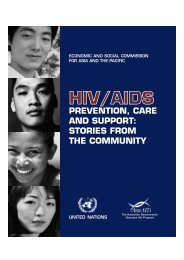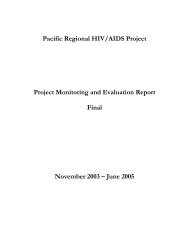The State of Business and HIV/AIDS (2006) - Booz Allen Hamilton
The State of Business and HIV/AIDS (2006) - Booz Allen Hamilton
The State of Business and HIV/AIDS (2006) - Booz Allen Hamilton
Create successful ePaper yourself
Turn your PDF publications into a flip-book with our unique Google optimized e-Paper software.
22<br />
3 Baseline: Current <strong>State</strong> <strong>of</strong> <strong>Business</strong> <strong>and</strong> <strong>AIDS</strong><br />
Figure 12<br />
Regional Treatment<br />
BPAS Baseline<br />
8<br />
respond to employee needs <strong>and</strong> are taking steps to<br />
ensure sustainability <strong>of</strong> the communities in which<br />
they operate.<br />
BPAS Index<br />
7<br />
6<br />
5<br />
4<br />
3<br />
2<br />
1<br />
0<br />
Overall Africa Elsewhere<br />
Regional Variations<br />
Companies with operations only in America <strong>and</strong><br />
Europe are less likely to focus on workplace<br />
programs because employees’ medical insurance<br />
benefits tend to cover <strong>HIV</strong>/<strong>AIDS</strong>. Several companies<br />
interviewed, however, expressed concern that<br />
<strong>HIV</strong>/<strong>AIDS</strong> is “falling <strong>of</strong>f the radar” in these regions<br />
<strong>and</strong> stated that companies should be doing more<br />
to keep <strong>HIV</strong>/<strong>AIDS</strong> on the agenda <strong>and</strong> high in the<br />
public conscience.<br />
employees) focus more effort on corporate<br />
philanthropy, product <strong>and</strong> service donation,<br />
community <strong>and</strong> government partnerships,<br />
<strong>and</strong> leadership <strong>and</strong> advocacy than larger size<br />
organizations. Large companies show markedly<br />
stronger response in workplace programs (nondiscrimination,<br />
prevention, testing, treatment).<br />
Interviews suggested that the reason for the lack <strong>of</strong><br />
action <strong>of</strong> smaller companies in the workplace is a<br />
perceived lack <strong>of</strong> need to address it if they have few<br />
employees or if internal resources do not exist to<br />
address <strong>HIV</strong>/<strong>AIDS</strong>. A few <strong>of</strong> the smaller companies<br />
do have workplace programs that include providing<br />
treatment to dependents, suggesting size is not a<br />
valid reason for not having a workplace program.<br />
Large multinational corporations (more than<br />
100,000 employees) are already addressing<br />
<strong>HIV</strong>/<strong>AIDS</strong> across a wide spectrum <strong>of</strong> activities<br />
that generally support increasing shareholder<br />
focus on corporate <strong>and</strong> social responsibility. <strong>The</strong>se<br />
companies are likely to have some operations<br />
in high prevalence areas <strong>and</strong> are expected to<br />
Those with operations in Africa are the most active<br />
in the workplace in relation to comprehensive<br />
programs (figure 12). <strong>The</strong> business case for acting<br />
in this region is clear—interviewees reported that<br />
companies cannot afford to delay their responses.<br />
More than 70 percent <strong>of</strong> companies surveyed<br />
with operations in Africa are now fully subsidizing<br />
access to <strong>HIV</strong> treatment for all employees. African<br />
companies also provide confidential testing services<br />
<strong>and</strong> access to treatment for registered or legal<br />
dependents.<br />
In emerging markets, such as India <strong>and</strong> China,<br />
companies are focusing on awareness <strong>and</strong><br />
prevention. Many interviewees expressed<br />
uncertainty about how to extend existing programs<br />
or implement new initiatives in these markets. A lack<br />
<strong>of</strong> <strong>HIV</strong>/<strong>AIDS</strong> awareness, a need for stigma reduction,<br />
limited information on prevalence rates, <strong>and</strong> a need<br />
to adapt approaches to new political <strong>and</strong> cultural<br />
environments were reasons cited as obstacles to<br />
rapid deployment or successful initiatives.











